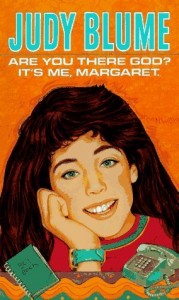Retro Friday is a weekly meme hosted by Angie of Angieville and focuses on reviewing books from the past. This can be an old favorite, an under-the-radar book you think deserves more attention, something woefully out of print, etc.
.
Still in the spirit of Banned Books Week, I thought I’d share about one of the books in the list that I read as I grew up for Retro Friday. I honestly had no idea why this had to be banned, because it’s quite a lovely book — I’m sure those who have read this would also agree. :)
 Are You There God? It’s Me, Margaret by Judy Blume
Are You There God? It’s Me, Margaret by Judy Blume
Publisher: Laurel Leaf/Bantam Doubleday Dell
Number of pages: 149
My copy: paperback, bought from Booksale
No one ever told Margaret Simon that eleven-going-on- twelve would be such a hard age. When her family moves to New Jersey, she has to adjust to life in the suburbs, a different school, and a whole new group of friends. Margaret knows she needs someone to talk to about growing up-and it’s not long before she’s found a solution.
Are you there God? It’s me, Margaret. I can’t wait until two o’clock God. That’s when our dance starts. Do you think I’ll get Philip Leroy for a partner? It’s not so much that I like him as a person God, but as a boy he’s very handsome. And I’d love to dance with him… just once or twice. Thank you God.
* * *
I think my mom bought this book because God is in the title. If I were only getting this now, I’d buy it for the same reasons, which goes to show how I am such my mother’s daughter. :)
I read this just as I was about to turn thirteen, I think. From the very start of the book, I liked Margaret. It’s so easy to relate to her. She’s a very normal kid with a normal family who has typical questions about growing up. She’s feeling changes in her body, and she’s learning about these changes from her new friends in school, and she finds that its awkward to talk to her parents about it. She starts liking guys and she wonders if the guys somehow likes her back, too. I see a lot of my teenage self in her, but the only thing that Margaret and I don’t have in common is the religion aspect. While I grew up in a devout Catholic, Margaret grew up without knowing any religion because of her parents’ different beliefs (her mom being Christian and her dad Jewish).
It’s been a while since I last read this book, so I can’t remember all the parts of it. However, I know I have fond memories of this book, so much that I re-read this books a couple of times. She’s one of those characters whose normalcy makes her charming, and it’s not often we find someone like that in YA books nowadays — at least not one who is not involved in a paranormal love triangle of some sort. Her voice was real and funny, and she wasn’t especially mean or beautiful or popular, and that makes it easier to relate to her.
I liked how Judy Blume was very brave to address these questions that every pre-teen girl has and answer it in a realistic manner. She didn’t sugarcoat anything, no matter how embarrassing other things are because they really happen — like stuffing cotton in training bras, looking for ways how to get rid of acne fast or pretending to have a period already just so they’re ahead of their peers. Thankfully, I didn’t have the same kinds of pressure when I was Margaret’s age. It wasn’t such a big deal for my friends and I on who gets their period first or what. I think the only “competition” that was somewhat evident back then was who gets a boyfriend first (which I have obviously lost until now :P).
I also liked how Judy Blume made Margaret’s faith a huge part of the story. I liked that the way Margaret talked to God here was like a friend, like she could talk to Him anytime, and yet still respects Him for being, well, God. Margaret’s confusion over her religion felt real, and it was nice to read about someone who was actively searching for her faith and something to believe in. I think people often forget the most important thing that religion helps us build: a personal relationship with God. I liked how Margaret had the chance to see and experience the different traditions of different religions, how Judy Blume led her character through all those experiences yet still not give us a final decision. Instead, she gives Margaret a reason to believe and continue to talk to God in the way she knows how. Which I think God appreciates since it comes from the heart. :)
I’m not sure if this book is recommendable to boys (but Judy Blume has a boy version of this book entitled Then Again, Maybe I Won’t), but I absolutely recommend this to girls and parents of pre-teen girls — it’s one of those books that a girl must read at least once in their lives.
Rating: [rating=4]

 Speak by Laurie Halse Anderson
Speak by Laurie Halse Anderson